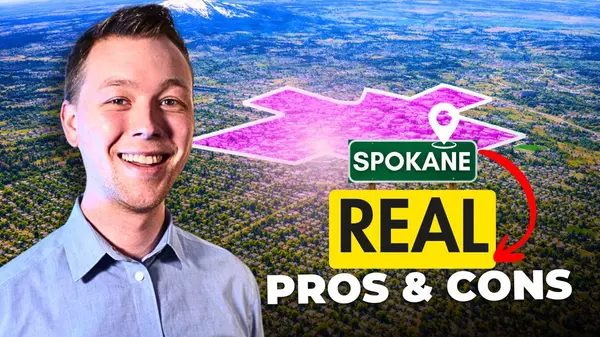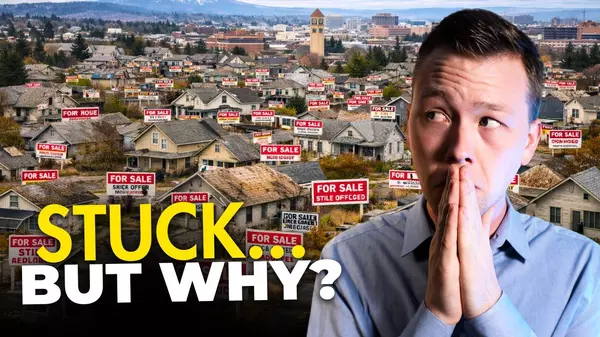Spokane's Economic Forecast: Key Takeaways for the Future
Welcome to today’s blog post, where we’re breaking down the highlights from the recent economic forecast event hosted by Greater Spokane Incorporated, Spokane’s Chamber of Commerce. Dr. Grant Forsyth, Chief Economist at Avista Corporation, shared insights into Spokane’s employment, housing, and economic growth trends. Whether you’re a long-time resident or considering a move to Spokane, there’s something here for everyone. Let’s dive in!

Employment Trends: Health Care Leading the Way
Employment can be one of the biggest indicators of an area’s economic health. According to Dr. Forsyth, Spokane saw robust job growth after the pandemic as businesses re-hired to meet demand. However, by the spring of 2024, this growth leveled off, particularly in Washington State, partly due to rising interest rates and policy uncertainties that made businesses more cautious.
What’s keeping Spokane’s job market steady?
- Health Care: Spokane’s health care sector has been a critical lifeline. It has grown enough to offset declines in other areas, increasing employment by 0.4% when it would have been negative without health care.
- Demographics: As Spokane’s population ages and more people relocate to the area, demand for health care services is rising.
For job seekers: This is a great time for those in health care or those considering the field, as demand is strong.

Housing Challenges: Affordability Issues and High Interest Rates
Dr. Forsyth didn’t sugarcoat the housing challenges Spokane faces. Median home prices are high, ranging between $400,000 and $500,000, while in Coeur d’Alene, they’re closer to $700,000. The demand surge over the past few years has pushed prices up, especially as people from higher-cost areas seek more affordable living in Spokane.
The affordability challenge:
- Interest Rates: Rising interest rates are making it difficult for many buyers to qualify for homes. Dr. Forsyth predicts rates will stay around 6% in 2025.
- Home Prices vs. Income: The gap between home prices and local income remains significant, making it especially tough for first-time buyers.
The rental market is also feeling the squeeze. Rents in Spokane have increased by about 14% since 2022. But there’s a bright side: more apartments are being built, and vacancy rates are slowly rising, which may help stabilize rents in the coming years.

New Construction: Apartments on the Rise
Despite high interest rates, Spokane has maintained steady residential building permits, with about 3,000 new units permitted yearly, primarily for apartments. For many people relocating here, apartments offer a more affordable entry point into Spokane’s housing market.
A hopeful sign for Spokane’s future:
- Apartments as a Solution: With housing inventory tight, apartments provide necessary housing, especially for those not yet ready or able to buy.
- Commercial Growth: Commercial building permits are also increasing, suggesting that Spokane’s economy is diversifying, with potential for more jobs and business opportunities ahead.

Other Key Concerns: Insurance and Maintenance Costs
Dr. Forsyth raised two other major concerns for Spokane’s housing market—insurance premiums and maintenance costs.
- Rising Insurance Premiums: Premiums are going up nationwide, potentially leading to an insurance market crisis where homeowners struggle to afford or secure coverage.
- Maintenance Costs: Inflation is driving up the cost of home repairs and upkeep. As Spokane’s housing values increase, budgeting for repairs—typically around 3% of your home’s value—becomes more costly.
What Does This Mean for Spokane Residents?
Spokane’s economic forecast reveals both strengths and challenges:
- Employment Growth: The health care industry will continue to drive employment, offering stability and opportunities.
- Housing: Affordability remains a concern, though increased apartment construction may provide some relief for renters.
- Spokane’s Outlook: While not in a recession, Spokane isn’t experiencing rapid growth either. Investment in downtown and local businesses could spur economic revitalization.
Whether you’re considering buying, renting, or simply curious about Spokane’s economic future, now is a great time to stay informed and be prepared.
Thinking about moving to Spokane or wondering how these trends might affect your home’s value?
If you’re planning to buy, relocate, or sell in Spokane, I’d be happy to help! Spokane has a lot to offer, and I’m here to make your real estate journey smooth and informed.
Categories
- All Blogs (910)
- Airway Heights (5)
- Audubon/Downriver (4)
- Balboa/South Indian Trail (5)
- Bemiss (3)
- Browne's Addition (3)
- Buying Your Home in Spokane (207)
- Cheney (3)
- Chief Garry Park (3)
- Cliff-Cannon (3)
- Colbert (1)
- Comstock (4)
- Cost of Living in Spokane (1)
- Dishman (3)
- Downtown Spokane (1)
- Driving Tours (1)
- East Central (3)
- Emerson/Garfield (3)
- Five Mile Prairie (5)
- Grandview/Thorpe (3)
- Greenacres (3)
- Hillyard (3)
- Home Improvement (8)
- Home Prices (5)
- Housing Inventory (6)
- Housing Market (133)
- Housing Market Update (2)
- Instagram Videos (2)
- Interest Rates (24)
- Job Market in Spokane (3)
- Know Spokane (608)
- Latah Valley (5)
- Liberty Lake (8)
- Lincoln Heights (4)
- Living in Spokane (2)
- Logan (3)
- Manito-Cannon Hill (3)
- Medical Lake (4)
- Minnehaha (3)
- Moran Prairie (3)
- Mortgage (26)
- Moving out of Spokane (3)
- Moving to Spokane (143)
- Nevada/Lidgerwood (3)
- New Construction Homes in Spokane (1)
- New Construction Opportunities (3)
- North Hill (3)
- North Indian Trail (4)
- Northwest (3)
- Opportunity (3)
- Peaceful Valley (3)
- Riverside (3)
- Rockwood (4)
- Selling Your Spokane Home (163)
- Shiloh Hills (3)
- Southgate (3)
- Spokane Events (447)
- Spokane Neighborhoods (51)
- Spokane Restaurants/Food Places (24)
- Spokane Schools (12)
- Spokane Valley (14)
- Suncrest (1)
- Things to Do in Spokane (460)
- Veradale (3)
- West Central (3)
- West Hills (3)
- Whitman (3)
- Youtube Videos (49)
Recent Posts












